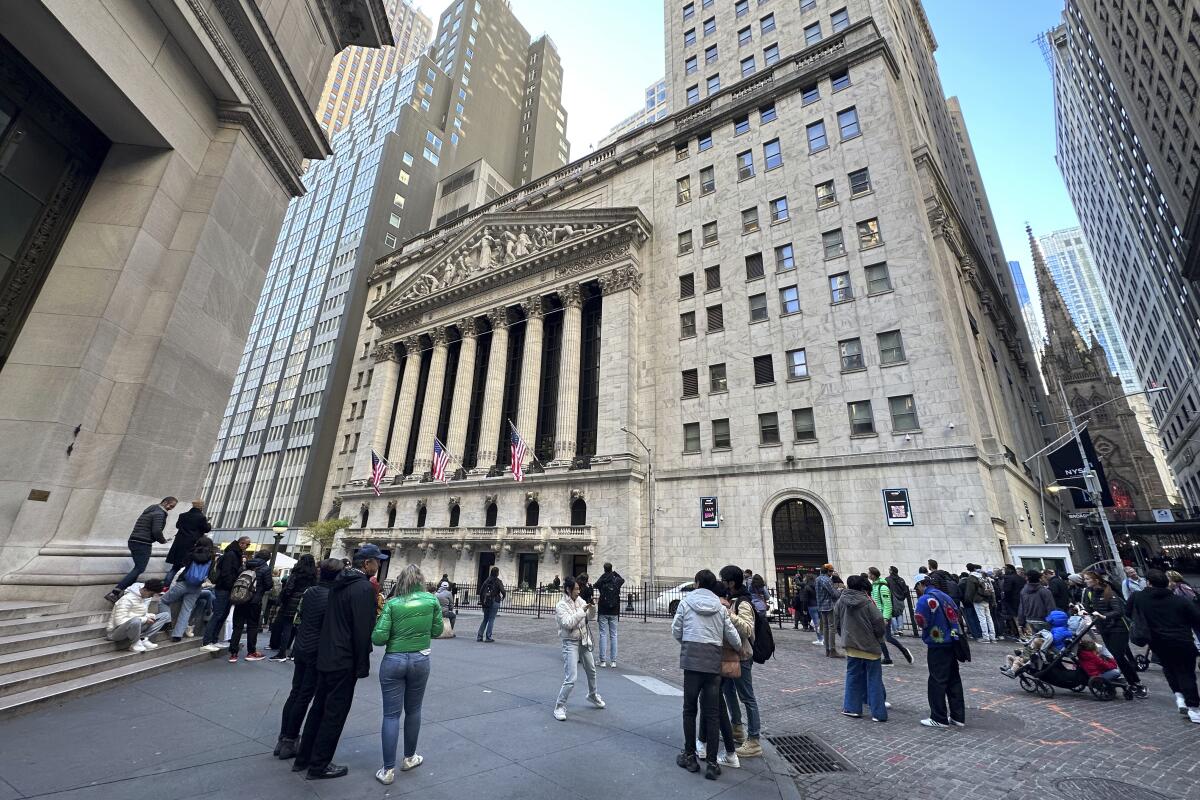Wall Street closes out its best month in more than a year

- Share via
Stocks closed mostly higher as the market ended November with its biggest monthly gain in more than a year.
The Standard & Poor’s 500 rose 0.4% after drifting between small gains and losses. The benchmark index rose 8.9% in November, its biggest monthly gain since July 2022.
The Dow Jones industrial average jumped 1.5%, while the Nasdaq composite slipped 0.2%. Both indexes also posted solid gains for the month, finishing with gains of 8.8% and 10.7%, respectively.
The market marched steadily higher for much of November as investors hope the Federal Reserve is finally done raising interest rates, a course of action that fights inflation by slowing the economy. Those hopes got more support with a report that the Fed’s preferred measure of inflation cooled last month.
November’s rally was also driven largely by the technology sector, where several companies with high values tend to disproportionately affect the market. Microsoft gained 12.1% for the month, while Nvidia rose 14.7%. Also, Treasury yields have generally been falling and easing pressure on stocks. High yields tend to make expensive stocks look less attractive to investors.
“The rally has been dramatic in its move,” said Quincy Krosby, chief global strategist for LPL Financial.
The momentum has stalled over the last week or so, which is the market’s way of dealing with an overbought scenario, she said, but it hardly suggests a deep sell-off ahead.
“What you want to see is that next leg up as we close the year,” she said. “November is a strong month for the market, but so is December.”
Thursday’s report from the Commerce Department said prices were unchanged from September to October, down from a 0.4% rise the previous month. Compared with a year ago, consumer prices rose 3% in October, less than the 3.4% annual rate in September. That was the lowest year-over-year inflation rate in more than 2½ years.
The Federal Reserve’s preferred inflation measure cooled last month, the latest sign that price pressures are waning in the face of high interest rates.
The Fed’s aggressive rate hike policy pushed its benchmark interest rate from near zero in 2022 to its highest level in two decades by the middle of 2023. The goal has been to bring inflation back down to the Fed’s target rate of 2%.
Wall Street is betting that the central bank will continue to hold rates steady at its December meeting and into early 2023, when it could start considering cutting interest rates. Fed officials have hinted at those possibilities, while also saying that any future moves will be based on economic data.
The latest data on economic growth and consumer confidence have also raised hopes that the Fed will achieve its goal of a “soft landing,” which involves cooling the inflation rate without throwing the economy into a recession. Meanwhile, the latest round of surprisingly encouraging corporate earnings reports gave investors more confidence that businesses and the economy can keep humming along.
Treasury yields gained ground. The yield on the 10-year Treasury, which influences mortgage rates, rose to 4.34% from 4.26% late Wednesday.
Traders had their eye on companies reporting quarterly results.
Software company Salesforce jumped 9.4% after giving investors a strong profit forecast. Cloud computing company Snowflake rose 7% after also giving Wall Street an encouraging financial forecast.
On the losing end, data storage company Pure Storage fell 12.2% after giving investors a disappointing revenue outlook.
Economists are preoccupied with making predictions about the future path of the U.S. economy, but keep getting fooled by the truth.
Also Thursday, the Labor Department said slightly more Americans filed for unemployment benefits last week, while the overall number of people in the U.S. collecting benefits rose to its highest level in two years. The report indicates that the labor market remains strong but is showing signs of softening.
Oil prices have also been falling, as have gasoline prices in the U.S., relieving pressure on consumers. The price of U.S. crude oil fell 2.4% on Thursday, despite the latest extension of production cuts by the Organization of the Petroleum Exporting Countries.
In Europe, the latest data showed that inflation dropped more than expected to 2.4% in November, the lowest in more than two years. The new figure is close to the European Central Bank’s inflation target of 2% and follows a rapid series of interest rate hikes dating to summer 2022.
All told, the S&P 500 rose 17.22 points to 4,567.80 on Thursday. The Dow jumped 520.47 points to 35,950.89, with an assist from Salesforce, which reported better-than-expected results and raised its outlook. The Nasdaq composite dropped 32.27 points to 14,226.22.
Stocks in Asia and Europe closed mostly higher.
AP writers Christopher Rugaber, Matt Ott and Elaine Kurtenbach contributed to this report.
More to Read
Inside the business of entertainment
The Wide Shot brings you news, analysis and insights on everything from streaming wars to production — and what it all means for the future.
You may occasionally receive promotional content from the Los Angeles Times.












